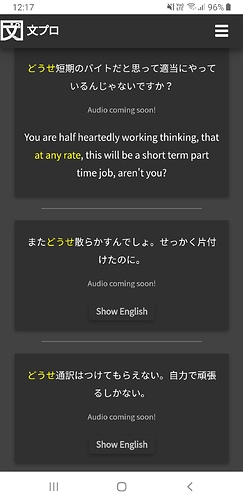This is popping up more and more frequently. Translations that are 100% backward to what the japanese sentence is… Eventhough the same word order sounds perfectly normal in english. Something like
(Thinking “oh well, it’s only a short term part time job” you’re only working half heartedly right?)
Makes a lot more sense when compared to the sentence. Sometimes it feels like whoever is doing the translations might be a bit too fluent in japanese, and in being so has forgotten how confusing completely rearranging things for no reason is for learners.
Hey 
Thank you for informing us about this issue!
We will do something about those translations!
If you find more confusing translations, feel free to PM me.
For this grammar point - https://bunpro.jp/grammar_points/628 <ように/so that> - I initially found the example sentences very confusing compared to the English translations, because the English sentence has the bits before and after the <ように/so that> reversed…
eg/ 目めが悪わるいので、字幕じまくが見みえるように椅子いすをテレビに近ちかづけた。 is translated as “Because I have bad eyes, I moved the chair closer to the TV so that I can see the subtitles.”. It can be written as “Because I have bad eyes, so that I can see the subtitles, I moved the chair closer to the TV.” , which would make it follow the Japanese word order more closely and not be so confusing. It’s the same for all the example sentences. The second last one is a bit confusing however.
“so that”, though not wrong, doesn’t sound natural to my ear in this setting. For a spin around translation, I hear “Because I have bad eyes, in order to see the subtitles I moved the chair closer to the TV”. I know it’s convenient for translation as our inner Yoda voices want to re-translate the English for Japanese  but I think “so that” requires a different word order IMO.
but I think “so that” requires a different word order IMO.
It does not need to sound natural. Sounding natural in english defeats the purpose of learning what sounds natural in japanese. A lot of learners dont understand this. Literal translations, or as close to literal as possible are by far the best because they show you what is normal in the target language.
You will never get anywhere speaking japanese with words that sound natural in english.
Hey 
I think I can change sentences so they would follow the Japanese word order more closely.
We try to avoid “in order to”, and use “so that” instead because the later one is closer to ように (since it is the one that usually follows can).
We are always open to propositions 
PS
In linguistic papers they translate like this:
That looks like a mess. The reason most people go to the internet is cause traditional teaching methods are so outdated.
I also would like to see more closer translations on Bunpro. Many translations are just far off from the Japanese original. I agree that literal translations are the best way to understand the language, even if it doesn’t sound very natural in English.
For example, I saw this sentence in my learning resource:
もう我慢の限界です。
…translated as: “I can’t take it anymore.”
Yeah, that sounds natural in English but it doesn’t help to understand the sentence.
Translating it as “It’s already the limit of (my) patience.” makes more sense.
So in cases like this I’d like to see the literal translation first on Bunpro and then maybe a bracketed more natural translation.
There was a discussion elsewhere of maybe having, like, a toggle between [Natural English] and [Literal Translation]; personally, I’d want an option like that at the account level. My English is purty durn good’n, I’d rather see the literal translation site-wide and worry about making the English sound natural on my own time.
With ~7,000 sentences in the BP library, perhaps it’s reasonable to narrow down a literal translation request such as this.
Personally, I would not use it as the the literal translation can heard in the Japanese sentence (as long as the surrounding vocab/grammar point/conjugation outside the lesson grammar point are understood). I admit the longer compound sentences require extra effort but I’m ok with that. The paint by numbers translation, though helpful when things get too complex or in the beginning, is not a habit I want to keep as the conciseness between the two languages do not run parallel.
My goodness, you’re not supposed to use the English translation when studying. It’s only a hint.
I disagree. Having a natural translation helps me figure out what kind of contexts this sentence is used in. Later on, if I want to say something like “I can’t take it anymore” in Japanese, I can remember this sentence is a good way to say it, rather than trying to remember which synonym for “patience” and which synonym for “limit” is most commonly used in this context.
If I want to figure out how that sentence can mean “I can’t take it anymore,” I’m already on Bunpou. I can look up parts of the sentence and the words I don’t understand.


